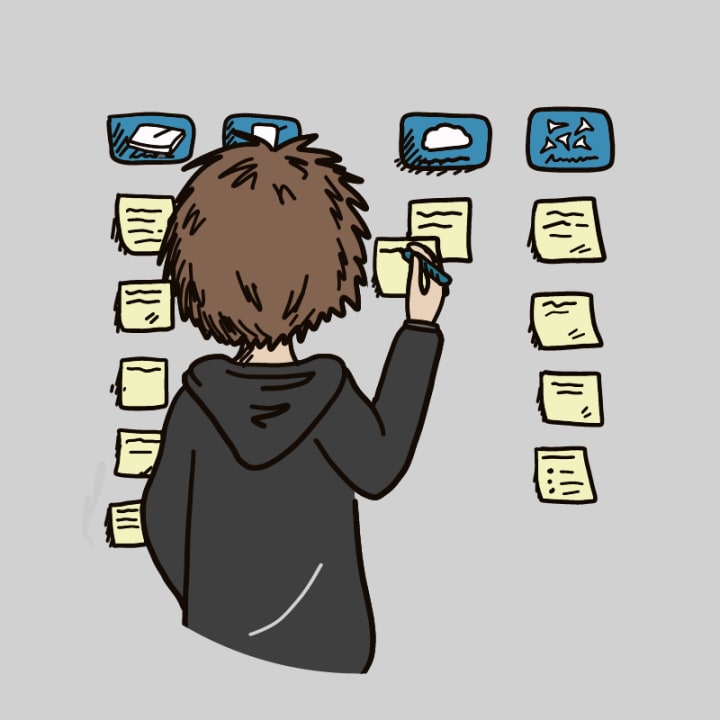4 Tips for New English Tutors
So, you want to start tutoring...well here are a few tips.

Teaching any subject is hard for trained/qualified tutors (people with a TESOL or TEFL certification). Thankfully we have the internet in this day and age which has led to an abundance of tools for teachers and tutors to use.
Unfortunately, this doesn't quite help with the whole 'how am I going to do this' part of things. If anything, this abundance of resources can be a little...overwhelming—especially if you're just starting out. With that in mind, I thought I'd share some tips that I picked up while tutoring English over the past 16 months.
1. Take a course or two.

Taking a course or two is particularly useful if you're just starting out—Pantheon
Okay, so let me start out by saying that taking a course in teaching isn't a mandatory thing—unless you're going to be working at a school then you kind of need one—but it does help if you have a qualification.
- It gives you an understanding of the fundamentals of teaching which helps when you're not too sure of what to do or how to do it.
- It lends a level of credibility to your character. Sure it's a piece of paper that says that you learned something but that piece of paper could be quite comforting for your prospective client (and yourself) who has some reassurance in knowing that: "Okay, this person knows what they're doing" kind of way.
Again, it's not really a must but I would definitely recommend it.
2. Marketing is key.

Good marketing = good business - Max My Profit
Marketing...promoting yourself and your product/service to prospective clients. Admittedly, marketing is not something that I'm too familiar with but even if I'm not too familiar with the subject I can see its importance.
Business Cards, websites, posters/banners, and so on can all be used to promote you and your services as a tutor. You can also talk to prospective clients—just ask around and see who's interested; you may be surprised.
3. Stay casual.

Client interaction isn't actually that complicated—methodkit
You've spent a stressful couple of weeks making phone calls, sending emails, handing out out business cards and knocking on doors; you've now generated a few interested people who would like your services. What next? Well, you have a meeting to discuss:
- Are you going to your client for a session or are they coming to you?
- Are you going to work via email correspondence or with video calling (i.e. with Skype)?
- When will these sessions take place and how long will they be?
Now, this is probably the oddest tip ever but stay casual with prospective clients when you meet with them. I'm not saying walk around in your underwear or pajamas; you need to dress comfortably but neatly and appropriately for the weather.
Treat your prospective client as a guest in your home (if that's where you're meeting); offer them a cup of coffee and a biscuit or some similar treat. Relax into your seat—don't slouch but sit comfortably; keep your body relaxed and chat. You can tell a few jokes if you like to break the ice but in general you just chat naturally with your client the way you would with any guest over for tea or just any other person you were talking to.
In the end you'll both be more comfortable and things will progress much smoother.
4. Be flexible.

It's important to know your limits - YouTube
This probably goes without saying but you're only human and you can only take so much before you burn out. So, be flexible in your approach to your work and be ready to explain things multiple times. You may need to change your approach for each student; everyone's different after all so no two people will learn in exactly the same way.
Another important thing to note is the length of time for each session with each client/student. I've found that younger students quite often have shorter attention spans so having them sit for a full hour and working is probably not the best idea if you want them to retain that information.
Regarding the sessions themselves, you should try to keep class/session times consistent. On the other hand you should be aware that you may, in some cases, have to change times or cancel a session.
Finally, make sure you have time for yourself. I can't stress this enough, make sure that you have time to relax between classes because otherwise the probability of burning out will increase.
Final Words: The choice is yours.

How you do it is up to you - Creative Educator
Ultimately the decision on how you approach tutoring is up to you. I can't tell you how to work and neither can anyone else; the only one who knows your brain is you after all. What I and many other tutors and teachers can do, is give advice and share thoughts which I hope you find helpful.
It's not an easy time, you are going to struggle at first as we all do, but it's well worth doing.
About the Creator
Greg Seebregts
I'm a South African writer, blogger and English tutor; I've published 1 novel and am working on publishing a 2nd. I also write reviews on whatever interests me. I have a YouTube Channel as well where I review books, and manga and so on.






Comments
There are no comments for this story
Be the first to respond and start the conversation.